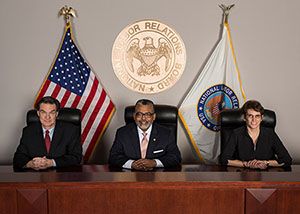One intended consequence of winning presidential elections is the right to appoint members to the various regulatory bodies and governmental boards which oversee and enforce our laws. One such board is the National Labor Relations Board (NLRB).

The Board has five Members and primarily acts as a quasi-judicial body in deciding cases on the basis of formal records in administrative proceedings. Board Members are appointed by the President to 5-year terms, with Senate consent, the term of one Member expiring each year.
And board rulings have consequences, too. To wit, Palermo’s Pizza in Milwaukee WI:
Palermo’s Pizza, the scene of a yearlong worker dispute, said Tuesday it had agreed to rehire eight workers with back pay and had asked the National Labor Relations Board to set a date for a union election.
“We have reluctantly agreed to this settlement, despite believing that the facts strongly support our position,” Palermo President and CEO Giacomo Fallucca said in a statement.
Rather than continue to draw out the process and go to court, Fallucca said, the company agreed to the settlement “with reservation so that an election can take place.” He said the company did not admit any fault in making the negotiated settlement.
For years, Republicans in the Senate refused to confirm President Obama’s picks for the NLRB. Their hope was to do an end around the constitution by nullifying the laws that created the NLRB and gave it power to protect employee rights. They came within one month of doing so, when in August the NLRB would have no longer had any enforcement power because it would only have two members. That strategy failed when Senate Majority Leader Harry Reid told Republican Senators that the president deserved an up-or-down vote on confirmations for these types of appointments and threatened to change Senate rules related to the filibuster. The Republicans blinked and we got our votes. Yesterday, we got our new board members:
WASHINGTON — The Senate confirmed all five of President Barack Obama’s nominees to the National Labor Relations Board on Tuesday, marking the first time in a decade that the agency has enjoyed a full slate of confirmed board members.[…]
The Senate confirmation places three Democrats and two Republicans on the five-member board, in keeping with the tradition of a three-member majority hailing from the president’s party. The Democrats are Mark Pearce, the current chairman; Nancy Schiffer, a labor lawyer from the AFL-CIO; and Kent Hirozawa, who’s served as chief counsel to Pearce. The Republicans are management-side labor lawyers Harry Johnson III and Philip Miscimarra.
So here is what I am hearing when I read the statement from Palermo Pizza’s CEO:
“Republicans promised us that they would never ever ever allow the NLRB to enforce any punishment against us so we ignored the law and refused to allow our employees to unionize. Today ‘we have reluctantly agreed to this settlement’ because the NLRB can now force us to obey those laws.”
Elections do Matter. The presidential election in 2012 mattered because Senate Minority Leader Mitch McConnell’s stated goal in 2009 of making Barack Obama a one-term president had failed. Republicans did not gain back the Senate, in fact they lost seats they were expected to win. Because Democrats voted and when we vote, we win.
The National Labor Relations Board was created by the National Labor Relations Act:
Congress enacted the National Labor Relations Act (“NLRA”) in 1935 to protect the rights of employees and employers, to encourage collective bargaining, and to curtail certain private sector labor and management practices, which can harm the general welfare of workers, businesses and the U.S. economy.
Here is an important paragraph from the act:
The inequality of bargaining power between employees who do not possess full freedom of association or actual liberty of contract and employers who are organized in the corporate or other forms of ownership association substantially burdens and affects the flow of commerce, and tends to aggravate recurrent business depressions, by depressing wage rates and the purchasing power of wage earners in industry and by preventing the stabilization of competitive wage rates and working conditions within and between industries.
The NLRA is not some kind of socialist manifesto. The intent of the act is to promote commerce by avoiding disruptive strikes and by keeping wage rates up to increase the “purchasing power of wage earners.” It codified the economic principle that when people earn money, they spend money. And when people spend money it is good for the economy, something lost on current Republicans who believe that when wealth flows up to the top 1%, those folks will take time away from designing their umpteenth vacation home (and car elevators!) and create us some jobs. No. Jobs are created when there is demand for a product or service. If there is no demand, no amount of tax breaks or relaxed regulation or outright gifts to corporations will create jobs. Put money into the hands of the the 300 million people who actually buy stuff with their wages and you drive demand for everything from housing to cars to dinner at the local restaurant.
Elections Matter. Every single election.
When the next election rolls around, in 2013 2014 2015 and 2016, don’t stay home. Because when we vote, we win. And so does America.
(Crossposted from Views from North Central Blogistan)
12 comments